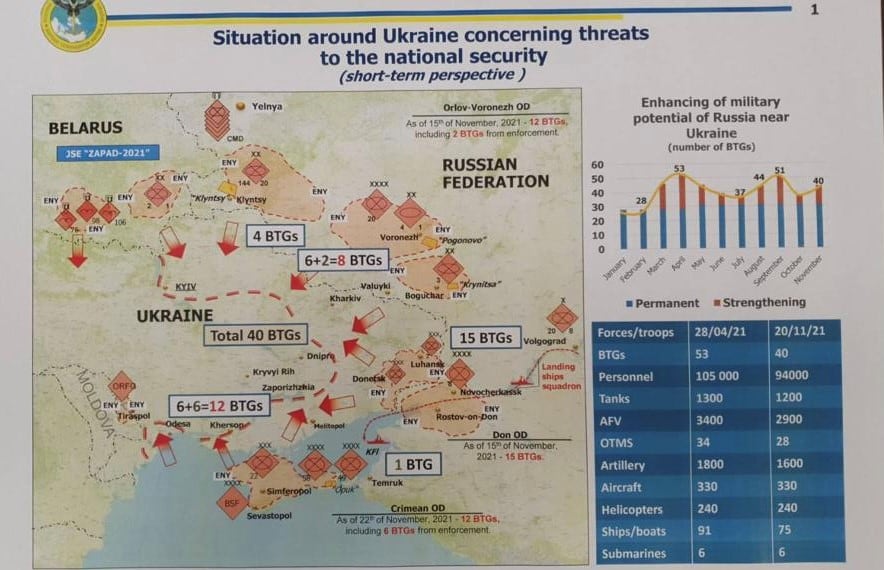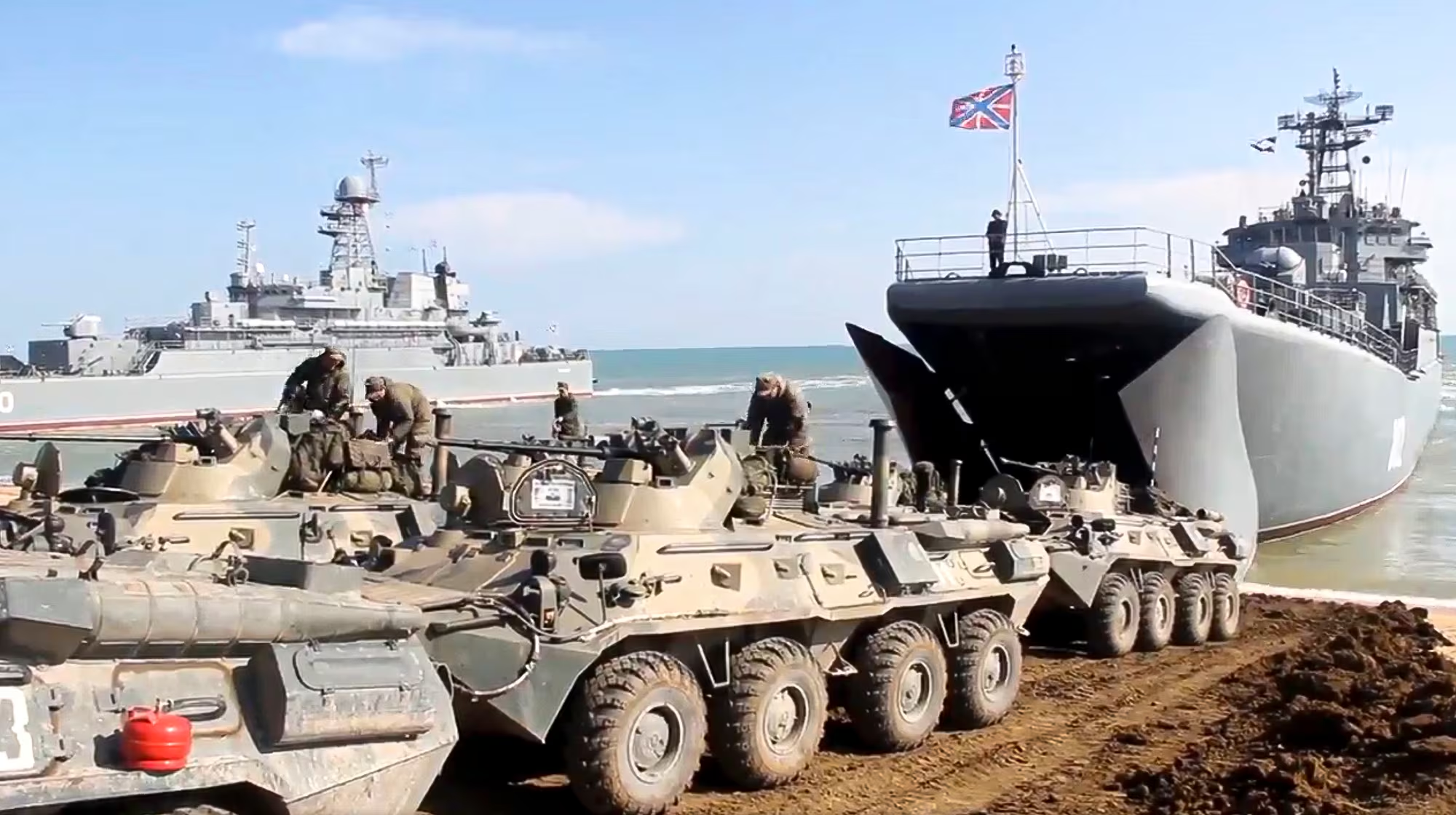MOSCOW (AP) — Ukrainian and Western officials are worried that a Russian military buildup near Ukraine could signal plans by Moscow to invade its ex-Soviet neighbor.
The Kremlin insists it has no such intention and has accused Ukraine and its Western backers of making the claims to cover up their own allegedly aggressive designs.
It’s unclear whether the Russian troop concentration heralds an imminent attack or represents an attempt by Russian President Vladimir Putin to persuade the U.S. and its NATO allies to refrain from sending soldiers and weapons to Ukraine, and drop plans for its eventual integration into NATO.
Wednesday, the U.S. Embassy in Kyiv issued an alert to U.S. citizens, warning them of “concerning reports of unusual Russian military activity near Ukraine’s borders and in occupied Crimea.”
Here is a look at the current tensions:
What are the roots of the Russia-Ukraine war?
Russia annexed Ukraine’s Crimean Peninsula in 2014 after the country’s Moscow-friendly president was driven from power by mass protests. Weeks later, Russia threw its weight behind a separatist insurgency that broke out in Ukraine’s east.
Ukraine and the West accused Russia of sending its troops and weapons to back the rebels. Moscow denied that, charging that Russians who joined the separatists were volunteers.
More than 14,000 people have died in the fighting that devastated Ukraine’s eastern industrial heartland known as Donbas.
A 2015 peace agreement brokered by France and Germany helped end large-scale battles, but efforts to reach a political settlement have failed and sporadic skirmishes have continued along the tense line of contact.
Earlier this year, a spike in cease-fire violations in the east and a Russian troop concentration near Ukraine fueled war fears, but tensions abated when Moscow pulled back the bulk of its forces after maneuvers in April.
The latest Russian military buildup

Ukraine complained this month that Moscow has kept about 90,000 troops not far from the two countries’ border following massive war games in western Russia in the fall.
The Ukrainian Defense Ministry said units of the Russian 41st army have remained near Yelnya, a town about 160 miles north of the Ukrainian border.
The commander-in-chief of the Ukrainian armed forces, Lt. Gen. Valeriy Zaluzhny, said Russia also has about 2,100 military personnel in the rebel-controlled east and that Russian officers hold all commanding positions in the separatist forces. Moscow has repeatedly denied the presence of its troops in eastern Ukraine.
Kyrylo Budanov, head of Ukraine’s military intelligence, claimed in a weekend interview with Military Times that Moscow has more than 92,000 troops arrayed around Ukraine’s border and was preparing for an attack from several directions, including from Russia’s ally Belarus, in late January or early February.
RELATED

Russia hasn’t provided any details about its troops numbers and locations, saying that their deployment on its own territory shouldn’t concern anyone.
What does Moscow want?
The Kremlin has accused Ukraine of failing to honor the 2015 peace deal and criticized the West for failing to encourage Ukrainian compliance. The agreement was a diplomatic coup for Moscow, requiring Ukraine to grant broad autonomy to the rebel regions and offer a sweeping amnesty to the rebels.
Ukraine, in turn, has pointed to cease-fire violations by Russia-backed separatists and the continuing Russian troops presence in the rebel east — accusations the Kremlin has denied.
Amid the recriminations, Russia has rejected a four-way meeting with Ukraine, France and Germany, saying it’s useless in view of Ukraine’s refusal to abide by the 2015 agreement.
Moscow has strongly criticized the U.S. and its NATO allies for providing Ukraine with weapons and holding joint drills, saying that encourages Ukrainian hawks to try and regain the rebel-held areas by force.
Earlier this year, Putin ominously said a military attempt by Ukraine to reclaim the rebel east would have “grave consequences for the Ukrainian statehood.”
The Russian leader has repeatedly asserted that Russians and Ukrainians are “one people,” and charged that large chunks of Ukrainian territory are historic parts of Russia — arbitrarily granted to Ukraine by Communist leaders under the Soviet Union.
Putin has strongly emphasized that Ukraine’s aspirations to join NATO represent a red line for Moscow, and also expressed concern about plans by some NATO members to set up military training centers in Ukraine. He said that would give them a military foothold there even without Ukraine joining NATO.
“They may put anything there under the guise of training centers,” Putin said last month. “Formal membership in NATO may never come, but the military development of the territory is already under way.”
Is the threat of a Russian invasion real?
Russia rejected talk of an invasion plot as a Western smear campaign and charged the claims could conceal a Ukrainian intention for an attack in the east. Ukraine denies such plans.
U.S. officials conceded that Moscow’s intentions are unclear, but pointed to Russia’s past behavior as a cause for concern.
The Daily Beast on Wednesday reported that Russian propagandists are readying their country for war.
“Domestic propagandists and state TV pundits are promoting the idea of an inevitable confrontation with the West as Russia’s military posture grows increasingly hostile, causing major concern for its nearest neighbors and NATO,” the news outlet reported.
Speaking to Ukraine’s foreign minister this month, U.S. Secretary of State Antony Blinken said Putin’s “playbook” was to build up forces near the border and then invade, “claiming falsely that (Russia) was provoked.”
Some observers interpret the troop buildup as a demonstration by Putin that Russia is prepared to raise the stakes to convince NATO to respect Moscow’s red lines and stop sending troops and weapons to Ukraine.
Last week, Putin noted with satisfaction that Moscow’s warnings finally have got some traction and caused a “certain stress” in the West. He added: “It’s necessary to keep them in that condition for as long as possible so that it doesn’t occur to them to stage some conflict on our western borders that we don’t need.”
He urged Russian diplomats to push for “serious long-term guarantees ensuring our security in this area because Russia can’t keep on going like that, constantly thinking about what could happen there tomorrow.”
Military Times senior managing editor Howard Altman contributed to this report.




